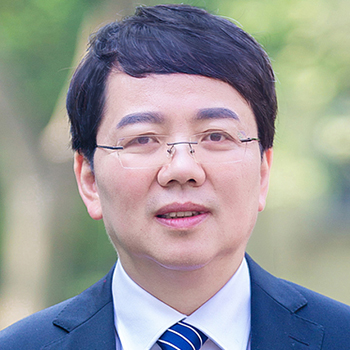
丁汉(Ding Han,Professor),1963年生,男,教授,博导,中国科学院院士。1989获华中科技大学工学博士学位,1993年受德国洪堡基金会资助赴德国斯图加特大学进行客座研究,1997年获国家杰出青年基金资助,2001年受聘为上海交通大学国家级领军人才教授,2005年和2011年两任国家973计划首席科学家,2013年当选为中国科学院院士。现任华中科技大学校学术委员会主任,国家数字化设计与制造创新中心主任,国家自然科学基金重大研究计划“共融机器人的基础理论与关键技术研究”指导专家组组长。
长期从事机器人与数字制造理论与技术的研究,将机器人学和制造技术相结合:在工业机器人领域,建立了机器人运动和操作规划理论和方法,突破了机器人离线编程与作业系统关键技术,在汽车制造行业得到持续应用;建立了复杂曲面宽行加工理论,揭示了刀具“空间运动-包络成形-加工误差”间的微分传递规律,提出了高速加工稳定性分析的全离散法,突破了叶轮叶片数字化智能化加工技术瓶颈,研制了自主知识产权的工艺软件TurboWorks,形成了叶盘叶片高效高精加工成套工艺解决方案,在中国航发多家企业得到成功应用;研制了大叶片机器人“测量-操作-加工”一体化(3M)磨抛系统,在中国中车、中航工业得到重要应用,取得显著的经济效益。
领导数字制造装备与技术国家重点实验室在2013、2018年两次评估中被评为优秀实验室。担任中国机械工程学会机器人分会主任委员、《中国科学:技术科学》副主编、《国家科学评论》编委、《科学通报》编委、IEEE/ASME机电一体化汇刊技术编辑、IEEE 机器人与自动化汇刊资深编辑等。作为大会共同主席,主办了首次在中国大陆召开的IEEE国际机器人和自动化大会(ICRA 2011)和中国机器人学术年会(CCRS 2018)。出版学术专著4部,发表SCI刊物论文230余篇。获得国家自然科学二等奖1项,国家教学成果一等奖1项,国家科技进步二等奖2项、三等奖1项。
研究领域:
◆ 数字化制造技术
◆ 机器人化智能制造
开设课程
本科生课程:
◆《机器人学》
◆《先进制造工程学》
◆《学科(专业)概论》
◆本科生毕业设计
科研项目
承担的科研项目:
(1) 科技部,“智能机器人”重点研发计划项目,2017YFB1301500,大型风电叶片机器人智能磨抛技术与系统,2017.12-2020.11,1366万元,在研,主持。
(2) 国家自然科学基金委员会,重点项目,51535004,大型复杂零件机器人加工理论与技术,2016.01-2020.12,355万元,在研,主持。
(3) 国家自然科学基金委员会,重大国际合作项目,51120155001,复杂曲面类零件五轴数控加工动力学与主动控制,2012.1-2016.12,305万元,已结题,主持。
(4) 科技部,重点基础研究发展计划(973计划项目),2011CB706800,难加工航空零件的数字化制造基础研究,2011.1-2015.8,3132万元,已结题,主持。
(5) 科技部,重点基础研究发展计划(973计划项目),2005CB724100,数字化制造基础研究,2005.1-2010.8,2777.51万元,已结题,主持。
论文专著与专利
近5年代表性论文:
(1) Shuo Zhang; Xingxing Ke; Qin Jiang; Han Ding*; Zhigang Wu*; Programmable and reprocessable multifunctional elastomeric sheets for soft origami robots, Science Robotics, 2021, 6(53).
(2) Han Ding*; Xuejun Yang; Nanning Zheng; Ming Li; Yinan Lai; Hao Wu*; Tri-Co Robot: a Chinese robotic research initiative for enhanced robot interaction capabilities, National Science Review, 2018, 5(6): 799-801.
(3) Ye Yuan*; Guijun Ma; Cheng Cheng; Beitong Zhou; Huan Zhao; Hai-Tao Zhang; Han Ding*; A general end-to-end diagnosis framework for manufacturing systems, National Science Review, 2020, 7(2): 418-429.
(4) Ye Yuan; Xiuchuan Tang; Wei Zhou; Wei Pan; Xiuting Li; Hai-Tao Zhang; Han Ding*; Jorge Goncalves*; Data driven discovery of cyber physical systems , Nature Communications, 2019, 10(1): 4894.
(5) He Xie; Wen-long Li*; Da-hu Zhu; Zhou-ping Yin; Han Ding; A Systematic Model of Machining Error Reduction in Robotic Grinding, IEEE/ASME Transactions on Mechatronics, 2020, 25(6): 2961-2972.
(6) Pei Zhou; Xingwei Zhao; Bo Tao*; Han Ding; Time-varying isobaric surface reconstruction and path planning for robotic grinding of weak-stiffness workpieces, Robotics and Computer Integrated Manufacturing, 2020, 64: 101945.
近5年其他论文:
(1) Yang Lin; Huan Zhao*; Han Ding; External Force Estimation forIndustrial Robots With Flexible Joints, IEEE Robotics and Automation Letters, 2020, 5(2): 1311-1318.
(2) Xingwei Zhao; Bo Tao*; Lu Qian; Yifan Yang; Han Ding; Asymmetricalnonlinear impedance control for dual robotic machining of thin-walledworkpieces, Robotics and Computer Integrated Manufacturing, 2020, 63: 101889.
(3) Huan Zhao; Minjie Tang*; Han Ding; HoPPF: A novel local surfacedescriptor for 3D object recognition, Pattern Recognition, 2020, 103: 107272.
(4) Jixiang Yang*; Dingwei Li; Congcong Ye; Han Ding; An analytical C3continuous tool path corner smoothing algorithm for 6R robot manipulator, Robotics and Computer Integrated Manufacturing, 2020, 64: 101947.
(5) Guang-Chao Nie; Ke Zhang; Jose Outeiro; Serafino Caruso; DomenicoUmbrello; Han Ding; Xiao-Ming Zhang*; Plastic Strain Threshold Determinationfor White Layer Formation in Hard Turning of AISI 52100 Steel Using Micro-GridTechnique and Finite Element Simulations , Journal of Manufacturing Scienceand Engineering - Transactions of the ASME, 2020, 142(3): 034501.
(6) Zhijie Wen; Ye Ding*; Pinkuan Liu; Han Ding; An EfficientIdentification Method for Dynamic Systems With Coupled Hysteresis and LinearDynamics: Application to Piezoelectric-Actuated Nanopositioning Stages , IEEE/ASME Transactions on Mechatronics, 2019, 24(1): 326-337.
(7) Le Cao; Xiao-Ming Zhang*; Tao Huang; Han Ding; Online MonitoringMachining Errors of Thin-Walled Workpiece: A Knowledge Embedded Sparse BayesianRegression Approach , IEEE/ASME Transactions on Mechatronics, 2019, 24(3):1259-1270.
(8) He Xie; Wen-Long Li*; Zhou-Ping Yin; Han Ding; Variance-MinimizationIterative Matching Method for Free-Form Surfaces-Part I: Theory and Method , IEEE Transactions on Automation Science and Engineering, 2019, 16(3): 1181-1191.
(9) He Xie; Wen-Long Li*; Zhou-Ping Yin; Han Ding; Variance-MinimizationIterative Matching Method for Free-Form Surfaces-Part II: Experiment andAnalysis , IEEE Transactions on Automation Science and Engineering, 2019, 16(3): 1192-1204.
(10) Chen Fan; Zhao Huan*; Li Dingwei; Chen Lin; Tan Chao; Ding Han; Contact force control and vibration suppression in robotic polishing with a smart end effector , Robotics and Computer Integrated Manufacturing, 2019, 57: 391-403.
(11) Xiuquan LIANG; Huan ZHAO*; Xiangfei LI; Han DING; Force trackingimpedance control with unknown environment via an iterative learning algorithm, Science China Information Sciences, 2019, 62(5): 050215.
(12) Zeyu Gong; Bo Tao*; Hua Yang; Zhouping Yin; Han Ding; An UncalibratedVisual Servo Method Based on Projective Homography, IEEE TRANSACTIONS ONAUTOMATION SCIENCE AND ENGINEERING, 2018, 15(2): 806-817.
(13) Yue Wu; Hai-Tao Zhang*; Tao Huang; Guiping Ren; Han Ding; RobustChatter Mitigation Control for Low Radial Immersion Machining Processes, IEEETRANSACTIONS ON AUTOMATION SCIENCE AND ENGINEERING, 2018, 15(4): 1972-1979.
(14) Tao Huang; Xiao-Ming Zhang*; Jürgen Leopold; Han Ding; ToolOrientation Planning in Milling With Process Dynamic Constraints: A MinimaxOptimization Approach , Journal of Manufacturing Science and Engineering -Transactions of the ASME, 2018, 140(11): 111002.
(15) Yang Lin; Huan Zhao*; Han Ding; Posture optimization methodology of 6Rindustrial robots for machining using performance evaluation indexes, Roboticsand Computer Integrated Manufacturing, 2017, 48: 59-72.
(16) Ye Yuan; Hai-Tao Zhang*; Yue Wu; Tao Zhu; Han Ding; BayesianLearning-Based Model-Predictive Vibration Control for Thin-Walled WorkpieceMachining Processes , IEEE/ASME Transactions on Mechatronics, 2017, 22(1):509-520.
(17) Dong Zhang; Xiao-Ming Zhang*; Jürgen Leopold; Han Ding; SubsurfaceDeformation Generated by Orthogonal Cutting: Analytical Modeling andExperimental Verification , Journal of Manufacturing Science and Engineering -Transactions of the ASME, 2017, 139(9): 094502.
(18) Ding Chen; Xiaojian Zhang*; Yakun Xie; Xiaoming Zhang; Han Ding; Aunified analytical cutting force model for variable helix end mills , International Journal of Advanced Manufacturing Technology, 2017, 92(9-12): 3167-3185.
(19) Hai-Tao Zhang; Zhiyong Chen*; Puwei Chen; Xiaoming Zhang; Han Ding; Saturated Output Regulation Approach for Active Vibration Control of Thin-WalledFlexible Workpieces With Voice Coil Actuators , IEEE/ASME Transactions onMechatronics, 2016, 21(1): 266-275.
(20) Xiangfei Li; Huan Zhao*; Xin Zhao; Han Ding; Dual sliding modecontouring control with high accuracy contour error estimation for five-axisCNC machine tools , International Journal of Machine Tools and Manufacture, 2016, 108: 74-82.
荣誉获奖
科研奖励:
(1) 丁汉(1/5); 复杂曲面数字化制造的几何推理理论与方法, 中华人民共和国国务院, 自然科学, 国家二等奖, 2012(丁汉; 朱向阳; 尹周平; 朱利民; 王煜).
(2) 丁汉(1/10); 研究型大学机械专业拔尖创新教育体系构建与实践, 中华人民共和国国务院、中华人民共和国教育部, 教学成果, 国家一等奖, 2018(丁汉; 何岭松; 尹周平; 吴波; 吴昌林; 陶波; 丁雨葵; 凌玲; 徐江; 张俐).
(3) 丁汉(1/10); 工业机器人作业系统的关键技术研究、开发与应用, 中华人民共和国国务院, 科技进步, 国家二等奖, 2007(丁汉; 陈建平; 言勇华; 朱向阳; 朱利民; 刘宝生; 张建荣; 熊振华; 郑觉; 盛鑫军).
(4) 丁汉(5/10); 发动机类零件的快速测量、数字建模及面向制造的设计, 中华人民共和国国务院, 科技进步, 国家二等奖, 2004(熊有伦; 尹周平; 刘宇; 杜晓明; 丁汉; 黄小平; 邵京城; 王国状; 杨文玉; 杨平海).
(5) 丁汉(1/11); 两机叶片高效智能加工关键技术研发与应用, 江苏省科技厅, 科技进步, 省部一等奖, 2018(丁汉; 严思杰; 王金吕; 代星; 张小俭; 朱大虎; 张小明; 赵欢; 腾树新; 张家军; 钱经纬).
(6) 丁汉(1/7); 复杂曲面零件数字化制造理论和方法, 中华人民共和国教育部, 自然科学, 省部一等奖, 2010(丁汉; 朱利民; 熊蔡华; 尹周平; 丁烨; 叶涛; 熊有伦).
(7) 丁汉(1/12); 工业机器人作业系统开发的关键技术与应用, 上海市科技厅, 科技进步, 省部一等奖, 2006(丁汉; 陈建平; 言勇华; 朱向阳; 朱利民; 刘宝生; 张建荣;熊振华; 郑觉; 盛鑫军; 栾楠; 王英).
(8) 丁汉(4/4); 精密数控加工系统的动力学特性与控制方法, 高等学校, 自然科学, 其他, 2017(朱利民; 谷国迎; 丁烨; 丁汉).
(9) 丁汉(2/4); 机器人操作规划与空间几何推理理论, 上海市科技厅, 自然科学, 省部一等奖, 2009(朱向阳; 丁汉; 王钧; 熊振华).